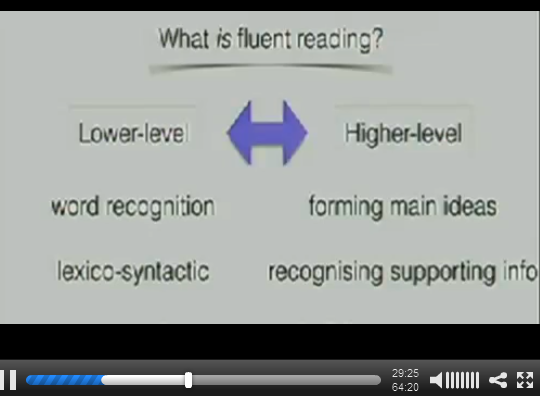Last year I volunteered and was successfully accepted to blog for Harrogate 2014 but due to unexpected events I had to cancel all my projects.
Today life is giving me a "second chance" to do what I love: enhance my teaching career with the best professional development available: being able to watch as many interviews and sessions as I can, thanks to the wonderful live streaming of this unique event: the 49th worldwide conference for teachers of English: IATEFL Manchester online.
For my first post I decided to watch "Forum on approaches to developing reading skills", where the first speaker, Peter Watkins, talked about Revisiting Reading.
http://iatefl.britishcouncil.org/2015/session/forum-approaches-developing-reading-skillsWhile doing some research among teachers, one of them told him once, that he always did reading whenever he was being observed. In a way, reading assures the result of a successful class.
Watkins also added that "there is a tendency to combine reading and testing: he thinks reading is actually testing".
He wondered what else could be done to engage students in a reading task and catch their full attention. "Is there anything else we can do?" "Why we do this?", he asked himself.
Also, he pointed out that we could build reading into a more global task design and leave aside the "pre-reading task followed by extracting the most relevant information from it".
He enhanced two types of reading: thin reading versus thick reading, being the former more a process than a product, opposite to the latter which makes the reader synthesize or draw inference from the text.
Finally, after presenting some activities, he advised teachers that they should see reading as a process. Actually teaching reading and not as testing, helps the teacher go deeper into the reading activity itself or go thoroughly into the students´understanding of the text as students start to justify their decisions. After students agree, disagree, compare or even ask for more explanation, the teacher can see where the misunderstanding lies which has made the students choose the wrong answer.
His last piece of advice was that "traditional questions should be used wisely chosen". Why? Because good questions are those that support students in their understanding, whereas
bad questions focus students on trivial or insignificant words or statements.
Teachers should be cautious when choosing a reading activity: they should look at the questions to see if they will help students understand the text better.
The following speaker was David Petrie who talks about Reason to Read. A Genre-specific development approach to reading: the Standard Reading approach, its pros and cons.
First, he showed different reading excerpts from some coursebooks from 2003 and 2005 which, according to him, did not lead to any type of students´emotional reaction to the text: the typical teenage response to reading average texts.
Second, he expressed that it was very remarkable to use texts in different situations, more realistic ones like emails, for example. He showed a slide containing an email he used in class, coming from an Yvory Coast lady who "wrote" to him asking him to help her with her inheritance of about 20 million dollars! (He did have "emotional reaction from the audience who burst into laughter because of the "imaginative" email) After that, he explained that students were asked to map, deconstruct or go beyond the reading which allowed them to be "critically engaged with the text they are reading and thinking what they are going to do with it later".
Finally, he revealed that he that type of "emotional reaction" to content came from a social media idea, which is a trendy nowadays.
Both of these speakers´ presentation slides have been uploaded to the IATEFL online website.
The third and last speaker, Michael Green´s talk from Kansai Gaidai University, was about Fluent Reading. He claimed that "the best way to foster fluency is doing lots and lots of extensive reading".
He made a comparison between low and high fluency levels.
He continued with several activities making teachers participate as a way to experience his research in the field. This time, as he interacted with teachers I had difficulty in listening and following all that was being done. All in all, his workshop seemed to be very enriching and motivating to those participating in it.
After the three presentations, teachers had the opportunity to make questions to the speakers.








No hay comentarios.:
Publicar un comentario